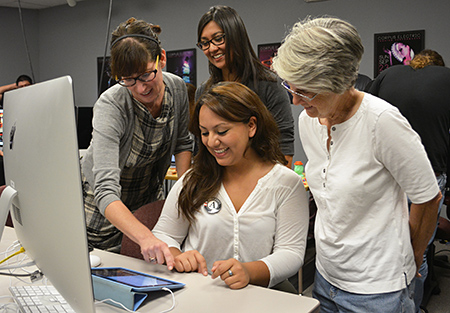
Photo: Margaret McKinney/Highlands University
Media arts professor Miriam Langer, far left, and Las Vegas Citizens Committee for Historic Preservation board member Martha McCaffrey, far right, look at the mobile app Mireya Rodríguez, seated, and Elizabeth Starks, standing, developed for the Bradbury Science Museum.
Las Vegas, N.M. — Media arts students from Highlands University helped preserve New Mexico’s rich cultural heritage in 2014 by creating websites, museum exhibits, mobile apps, promotional videos, a book design and more for cultural institutions across the state.
The 18 students are paid interns in the university’s one-of-a kind AmeriCorps Cultural Technology program, or ACT. Their projects were center stage at Highlands Sept. 26 for a tech showcase and AmeriCorps graduation ceremony.
“I’m extremely impressed with the quality of the media arts students’ service and professional outcomes for museums in New Mexico,” said Tova Pertman, AmeriCorps program officer for state and national programs. “They’re using their talent and skills to produce fantastic work that combines technology and design to educate communities about the cultural heritage of the state.”
Pertman, who was visiting from the AmeriCorps office in Washington, D.C., added that she could sense the passion that the students had for their projects.
ACT, now in its fifth year, is an ongoing partnership between Highlands and the New Mexico Department of Cultural Affairs (DCA).
“Thank you for your outstanding contribution to cultural institutions in New Mexico,” said Mimi Roberts, DCA media projects director. “It’s always wonderful to see the cumulative impact of your work at these tech showcases each year.”
The AmeriCorps interns worked at sites like the National Hispanic Cultural Center, New Mexico History Museum, Aztec Ruins National Monument, City of Las Vegas Museum, New Mexico State Library, and New Mexico Museum of Natural History and Science.
Mireya Rodríguez and Elizabeth Starks are a senior and a graduate student, respectively, in the software system design concentration in media arts. The two students developed an interactive mobile app about owls and bats of the Los Alamos area for the Bradbury Science Museum’s new exhibit, Environmental Research and Monitoring.
The museum is part of Los Alamos National Laboratory (LANL).
“Since the lab is closed to the public, this museum exhibition gives people a chance to see the kind of wildlife we have on the Pajarito Plateau,” said Jenn Payne, the team leader for the Resource Management Team at LANL who supervised the students. “Mireya and Elizabeth’s work on this app is incredible. It’s beautiful, educational, engaging, interactive and fun for all ages. The app will have national and global reach.”
“It was interesting to work with a diverse team of scientists, exhibit designers and developers, and application developers to create the app from start to finish,” Starks said. “I learned a new platform — PhoneGap — to create a real-world app that will be used by the public. This was professionally satisfying.”
The app is expected to be available at Apple’s App Store by the end of the year. It will also be used for educational outreach to schoolchildren at pueblos in New Mexico as well as Los Alamos-area schools.
The Highlands University AmeriCorps Cultural Technology program is federally funded. To date, 49 media arts students have graduated from the program.
“ACT is a small program that’s making a big impact on New Mexico’s cultural institutions,” said Lauren Addario, media arts instructor and ACT director. “The program also directly benefits our student’ career advancement, with 79 percent going on to professional positions in their field or investing in their future by attending graduate school.”
